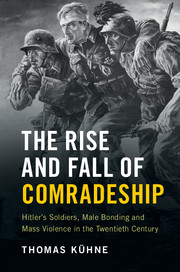Refine search
Actions for selected content:
15418 results in Military history
4 - The Wardroom as a Social Space
-
- Book:
- A Social History of British Naval Officers, 1775-1815
- Published by:
- Boydell & Brewer
- Published online:
- 20 April 2017
- Print publication:
- 17 February 2017, pp 83-104
-
- Chapter
- Export citation
Bibliography
-
- Book:
- The Principality of Antioch and its Frontiers in the Twelfth Century
- Published by:
- Boydell & Brewer
- Published online:
- 09 May 2017
- Print publication:
- 17 February 2017, pp 253-276
-
- Chapter
- Export citation
List of Illustrations
-
- Book:
- A Social History of British Naval Officers, 1775-1815
- Published by:
- Boydell & Brewer
- Published online:
- 20 April 2017
- Print publication:
- 17 February 2017, pp ix-x
-
- Chapter
- Export citation
3 - Central Governance and Military Service
-
- Book:
- The Principality of Antioch and its Frontiers in the Twelfth Century
- Published by:
- Boydell & Brewer
- Published online:
- 09 May 2017
- Print publication:
- 17 February 2017, pp 86-127
-
- Chapter
- Export citation
6 - Pay and Prize Money
-
- Book:
- A Social History of British Naval Officers, 1775-1815
- Published by:
- Boydell & Brewer
- Published online:
- 20 April 2017
- Print publication:
- 17 February 2017, pp 131-154
-
- Chapter
- Export citation
Abbreviations
-
- Book:
- The Principality of Antioch and its Frontiers in the Twelfth Century
- Published by:
- Boydell & Brewer
- Published online:
- 09 May 2017
- Print publication:
- 17 February 2017, pp ix-xii
-
- Chapter
- Export citation
4 - Lordship in the Principality
-
- Book:
- The Principality of Antioch and its Frontiers in the Twelfth Century
- Published by:
- Boydell & Brewer
- Published online:
- 09 May 2017
- Print publication:
- 17 February 2017, pp 128-163
-
- Chapter
- Export citation

The Rise and Fall of Comradeship
- Hitler's Soldiers, Male Bonding and Mass Violence in the Twentieth Century
-
- Published online:
- 16 February 2017
- Print publication:
- 07 February 2017
Chapter 6 - ‘A Good Man to Serve Under’
-
- Book:
- Soldiers and Gentlemen
- Published online:
- 07 September 2017
- Print publication:
- 14 February 2017, pp 143-170
-
- Chapter
- Export citation
Chapter 7 - ‘The Destiny of the Empire’
-
- Book:
- Soldiers and Gentlemen
- Published online:
- 07 September 2017
- Print publication:
- 14 February 2017, pp 171-200
-
- Chapter
- Export citation
Appendix C - Battalion Organisation
-
- Book:
- Soldiers and Gentlemen
- Published online:
- 07 September 2017
- Print publication:
- 14 February 2017, pp 226-227
-
- Chapter
- Export citation
Dedication
-
- Book:
- Soldiers and Gentlemen
- Published online:
- 07 September 2017
- Print publication:
- 14 February 2017, pp v-vi
-
- Chapter
- Export citation
Chapter 4 - ‘Serious, Scientific War’
-
- Book:
- Soldiers and Gentlemen
- Published online:
- 07 September 2017
- Print publication:
- 14 February 2017, pp 88-118
-
- Chapter
- Export citation
Notes
-
- Book:
- Soldiers and Gentlemen
- Published online:
- 07 September 2017
- Print publication:
- 14 February 2017, pp 228-274
-
- Chapter
- Export citation
Conclusion
-
- Book:
- Soldiers and Gentlemen
- Published online:
- 07 September 2017
- Print publication:
- 14 February 2017, pp 201-210
-
- Chapter
- Export citation
Introduction
-
- Book:
- Soldiers and Gentlemen
- Published online:
- 07 September 2017
- Print publication:
- 14 February 2017, pp 1-11
-
- Chapter
- Export citation
Bibliography
-
- Book:
- Soldiers and Gentlemen
- Published online:
- 07 September 2017
- Print publication:
- 14 February 2017, pp 275-292
-
- Chapter
- Export citation
Chapter 2 - ‘Everything is a Terrible Muddle’
-
- Book:
- Soldiers and Gentlemen
- Published online:
- 07 September 2017
- Print publication:
- 14 February 2017, pp 39-62
-
- Chapter
- Export citation
Appendices
-
- Book:
- Soldiers and Gentlemen
- Published online:
- 07 September 2017
- Print publication:
- 14 February 2017, pp 211-227
-
- Chapter
- Export citation
Contents
-
- Book:
- Soldiers and Gentlemen
- Published online:
- 07 September 2017
- Print publication:
- 14 February 2017, pp ix-ix
-
- Chapter
- Export citation
